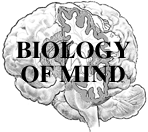
Psychology, Anthropology, Neuroscience, and Zoology 619 - Spring
2004
Course Mechanics

The classes will be lecture/discussion. The text for the course
is "The Biology of Mind - Origins and Structures of Mind, Brain,
and Consciousness", M. Deric Bownds, Fitzgerald Science Press,
1999. Fitzgerald Press has folded, and Wiley Publications has taken
over distribution. The discussion/lectures will proceed on the
assumption that you have assimilated the assigned chapters and
will not repeat their material except to deal with questions of
comprehension and debate that they generate. The text draft on
this website has detailed references not available in its printed
version.
The course grade will be based on approximately seven pop quizzes
on material covered either in lecture or the book and also seven
brief essays (~ six pages in length) due every two weeks. Missed
quizzes or late essays can not be made up. The quiz and essay with
the lowest grade will be deleted to yield a total of twelve grades
that will determine your course grade.
The essays are your presentation, commentary, critique or alternate
version of topics from the book or lectures that interest you.
Your own critical opinions are central. Don't worry about being
encyclopedic. Make yourself the authority (for example, not "Dr.
Bownds said....X, then said Y," but rather "X and Y are alternate
ideas about.......I prefer Y because...."). Be sure to cite references
that you use. Picture yourself as an independent scholar, co-learner,
or collaborator in this course, not as a passive recipient of revealed
knowledge. Imagine that you are trying to teach or explain the
material to someone else.
NOTE: COPIES OF SOME OF THE BETTER PAPERS SUBMITTED BY STUDENTS
IN PREVIOUS YEARS OF THIS COURSE ARE ON THE RESERVE SHELF IN THE
BIOLOGY LIBRARY
Here are a few points to use in evaluating your work, as well
as the work of others. (These are modified from comments Prof.
Shena Rogers has developed for use in Psychology 225).
An unacceptable paper often only reports the work and ideas of
others. The paper will have little organization. Sentences and
paragraphs can be cut and moved elsewhere without altering the
effectiveness of the text. There will be few if any generalizqation
drawn, and no analyses of ideas, or analyses of the results of
studies.
An OK paper will be similar to the unacceptable one in its organizational
problems, but there will be evidence that you have tried to think
or reflect about the ideas and finding that you encountered, to
draw some inferences and generalization about them in a bottom-up
way.
A good paper will show some use of your own ideas to organize
and analyze the problems and literature. This is top-down, deductive
reasoning. Organization may still be weak, with some obvious holes
in the reasoning.
A very good paper will definitely show top-down (deductive) thinking.
Your ideas will be central to the paper. There will be careful
analyses of the problem and of the literature, breaking down the
ideas, consideration of counter-arguments and so on. The paper
will be tightly organized, with hardly a sentence out of place.
All of this with some theory-building, abstract comparison of ideas,
etc. is a definite A.
Grading Scale:
C = significant incomprehension of the material, difficulty in
formulatingideas, reports only the work/ideas of others, little
organization, sentences and paragraphs could be moved around without
altering the effectiveness of the text, few generalizations if
any are drawn, no analysis of ideas
B = reasonable rendition or rearrangement of ideas, writing paragraphs
with content, expressed in student's own voice with a few points
of commentary or analysis, evidence of reflection by the student,
drawing some inferences, "getting it right."
A/B = effort to develop and critique a topic, perhaps use of outsidesources
or definition of an interesting topic, use of some of your own
ideas to organize and analyze the problem (top-down deductive reasoning).
A = clearly original thinking, proposals, critiques, clear deductive
reasoning, student's ideas are central to the paper, careful analysis
of the problem and the literature, breaking down the ideas, consideration
of counterarguments, tightly organized, some theory building and
abstract comparison of ideas.
You can send an email to everyone in the course (on course-related
matters only!) at panz-619@lists.students.wisc.edu I
will be using this address to send you information on the course.
|
